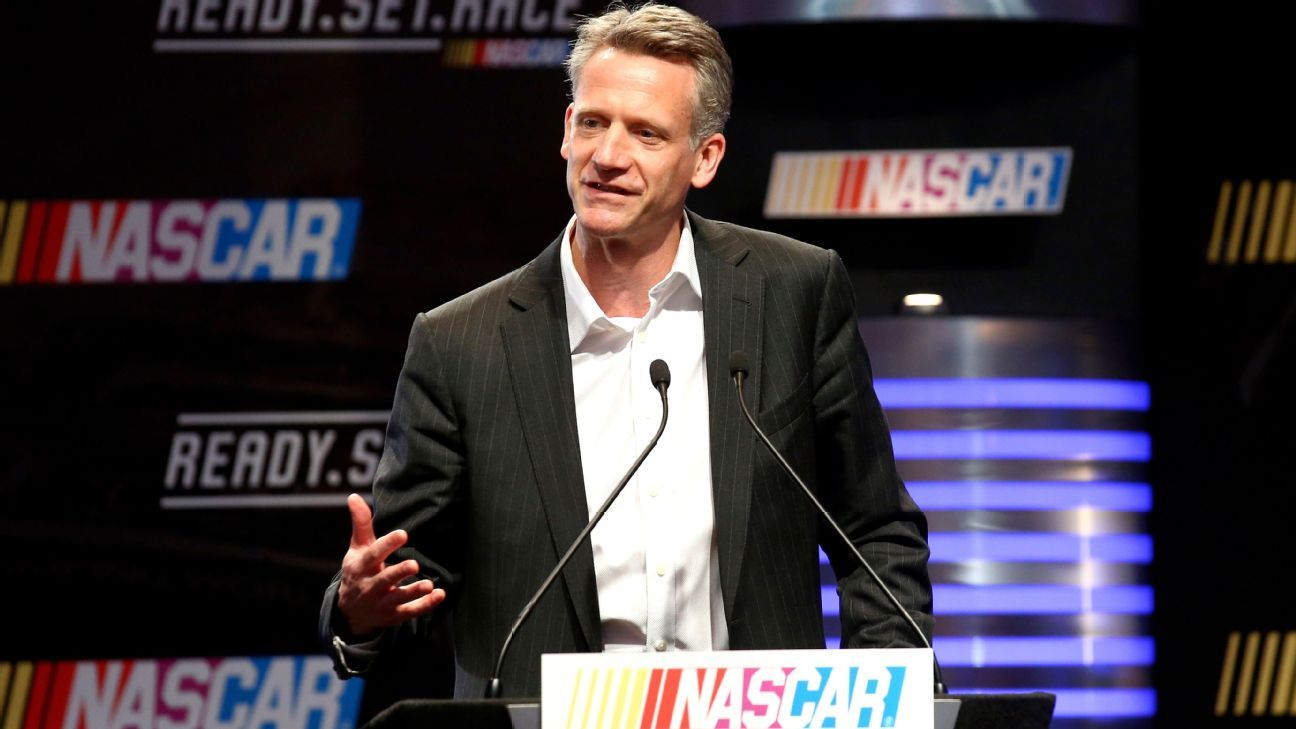CHARLOTTE, N.C. — We have some advice for you, Mr. Phelps.
Steve Phelps moves into his new role as NASCAR president come Monday morning. He’s worked for NASCAR since 2004, so he’s intimately familiar with the works of NASCAR through his roles of chief marketing officer and chief operating officer.
He met Wednesday with about 20 media members for a 65-minute session, in which he talked about issues in the sport. He didn’t say anything controversial — he knows how the NASCAR game is played, and one of the rules is you don’t make bold statements to the media in unrehearsed fashion and/or without notifying other stakeholders.
He expects that there will be criticism from teams, drivers and media. Phelps even had a line — “You guys are part of this family, this community, and you’re going to get folks that will disagree and be unhappy with the decisions that are made” — that made at least this reporter cringe, thinking a preferable description of the media would be as the family biographers or family analysts.
In that spirit, here are the areas that Phelps should make a priority, and this includes some of his comments on those topics from the media session.
1. The schedule
Fans are tired of hearing about changes maybe being made to the schedule. It’s time for action. Whether Phelps can finally figure out a way to move some races from tracks without significantly depleting the bottom line of the two major track operators remains to be seen. It will be easier if NASCAR is willing to actually buy dates back.
“There are changes that I believe will happen in the 2020 schedule that will be [made from] input from a lot of different folks,” Phelps said. “And one of those important groups will be our fans — what they like, what don’t they like.”
That comment is significant considering the track deals are supposed to go through 2020. But NASCAR and the television networks (especially NBC) apparently are interested in a shake-up, midweek races, doubleheaders and/or ending the season earlier than the week before Thanksgiving.
Phelps said “we will rule out nothing” as far as scheduling.
“We’re looking at everything, and we’ll get with our industry and get input from them and … we will make a decision of what we believe is in the best interest of NASCAR,” Phelps said.
2. Rules package
NASCAR is expected to release the 2019 rules package next week — its deadline to get it to the teams is Monday and Phelps indicated it would be announced Tuesday.
It sounds as if the drafting package will be used in a dozen or more races next year, and teams wanted to have fewer changes from week to week, primarily working with changes to aero ducts and how the air flows through the engine (whether to use restrictor plates or a different-sized tapered spacer, depending on the track).
“We want to have the best racing we can … which is close, competitive, side-by-side racing. That’s a goal that we’re always on,” Phelps said.
It also sounds like Phelps will defer to his competition team headed by Steve O’Donnell to make most of those decisions.
“It will continue to be their job,” Phelps said. “It will be my job to understand what they’re doing and to be well-versed on that and give my opinion if I think I can help them. But it’s theirs to run.”
3. Team solvency
The Furniture Row Racing closing is a kick in the gut to NASCAR. Phelps, though, doesn’t believe it is shaking the NASCAR foundation core.
“We’re sorry to see [team owner] Barney [Visser] go, frankly,” Phelps said. “Barney is a gentle giant, kind of a quiet force. … We don’t want to see ownership leave or owners switch like that, particularly when you have someone who is your reigning owner of your champion.
“There are circumstances that happened as part of his deal from an expense standpoint and from a sponsorship standpoint that he didn’t feel he could make work. And some family things. Do I think it’s systemic [of the sport]? I don’t.”
That is not the view of some in the industry. Phelps acknowledged that NASCAR needs to find ways to help teams from a revenue standpoint and that NASCAR is working with the teams to have competitive racing that doesn’t ratchet up costs. And how it can encourage new owners to come into the sport.
“It’s not easy, and we’ve got to figure out how to make that a much easier process,” he said.
4. Talent development
NASCAR needs to find ways to develop the true talent from its weekly short tracks. Phelps touted the NASCAR Next program, which has successfully helped the exposure of talented drivers as sponsors do less brand development for up-and-coming drivers, but the next step is to have drivers who already have local fan bases be able to race up the NASCAR ladder.
That also includes healthy teams in NASCAR’s developmental series. Phelps cited the move to composite bodies in the Xfinity Series and the common engine in the Truck series have helped the teams. He also believes with Camping World switching to Gander Mountain as the sponsor of the trucks and the continued engagement of Xfinity will help both series.
5. NASCAR leadership stability
This is something Phelps doesn’t have control over. He was asked about whether Brian France will return as CEO and about a possible sale of NASCAR.
Phelps pretty much said he will comment on what he knows at the moment — that interim CEO Jim France (Brian’s uncle) is well-engaged in the sport.
“Jim France and [Jim’s niece] Lesa France Kennedy are committed to this sport, and they will continue to have their hand on this sport for a long, long time,” Phelps said.
That is a fair answer. It’s not a Phelps decision on who will be CEO. That is the responsibility of Jim and Lesa, who so far haven’t talked at all about the future of Brian or the CEO role or anything about their vision for the sport. And with all due respect to Phelps and the fact that his voice and vision do carry considerable weight, it would be beneficial to hear from someone with the last name of France, the family who owns the sport, sometime soon.
Until they do speak, everyone should be guessing (and hopefully Phelps has a guaranteed multiyear compensation package if they bring in a boss whose ideas don’t mix well with those of Phelps).
6. Openness on issues
Phelps did try to be a little bit more “real” than his comments in August when he questioned why there was such a negative narrative on the sport.
“Our sport has headwinds, for sure, and we’re addressing those headwinds head-on,” Phelps said. “We’re going to do it as a sport. We’re going to do it with our teams, with our drivers, with our track, media partners and our sponsors.”
He stressed that he has “no doubt this sport is going to grow” if the stakeholders can come together.
Phelps also stressed that race promotions need to change, indicating NASCAR is working with the tracks to create unique opportunities that reach fans to get them to the track.
“We need to reinvent the event promotion, what that looks like,” Phelps said. “That gets back to a collaboration effort … between our racetracks, NASCAR, our broadcast partners and our teams and drivers in order to promote this sport in a way we haven’t in the past.”
7. TV/digital platforms
The television contract doesn’t end until 2024, so NASCAR is probably about three to four years away from beginning to negotiate a new deal. The media landscape is changing so quickly that it is hard to conceive a strategy at this time.
But Phelps needs to start looking at how NASCAR sells its digital rights and if it could go to some type of streaming service.
“It’s our job to make sure that we’re putting on the most compelling racing we can and to create relevance as much as we can, driving driver interest as much as we can and storylines as much as we can,” Phelps said. “Having phenomenal racing that is resonating is the most important thing.
“If we’re able to do that, I’m confident that whatever that new deal looks like will be a good deal for us.”

